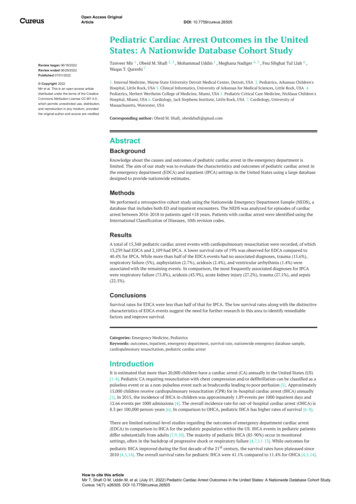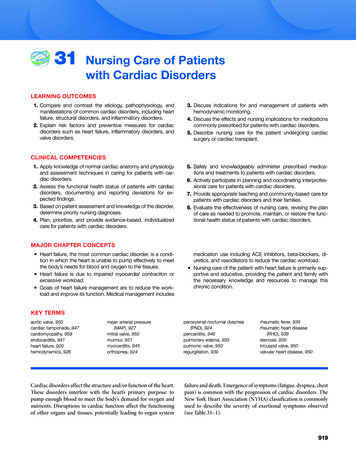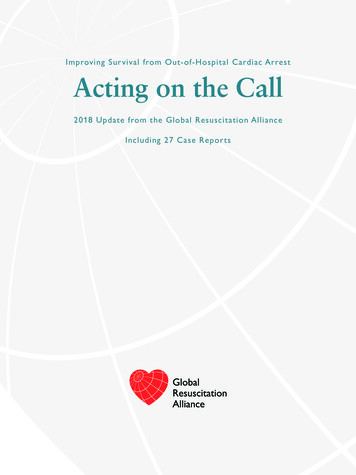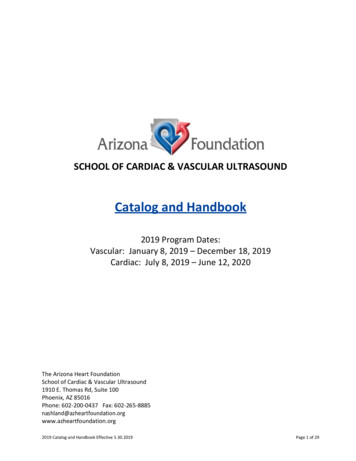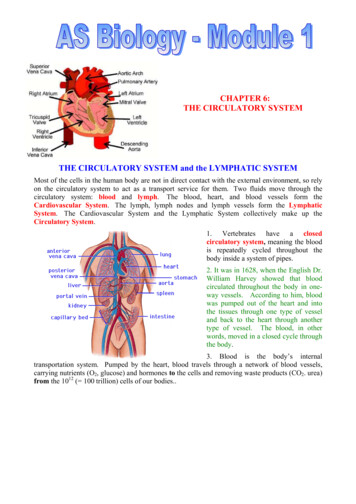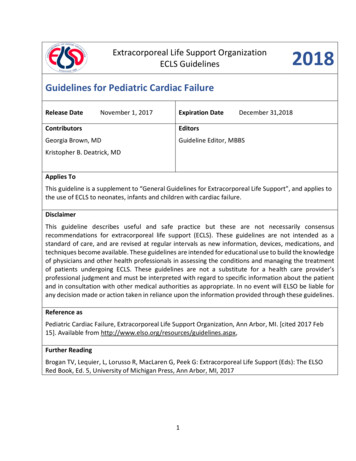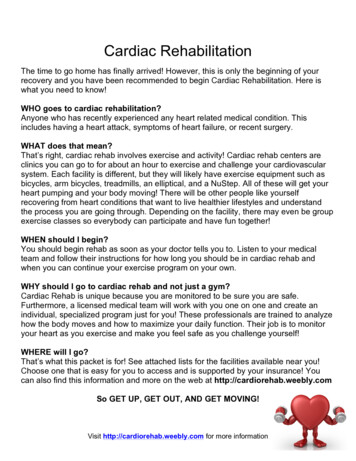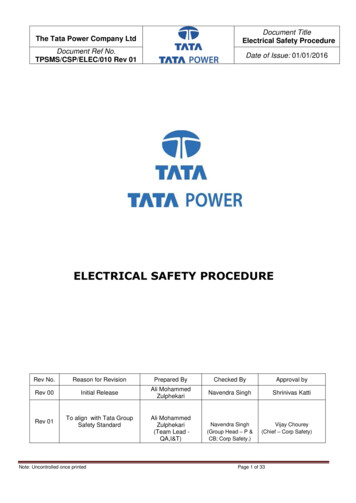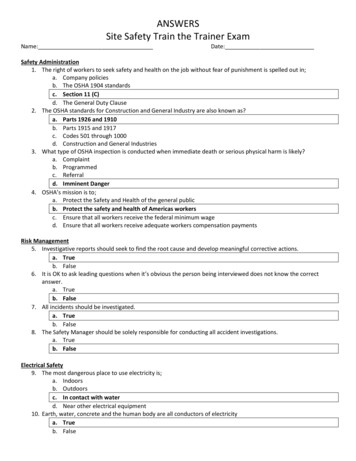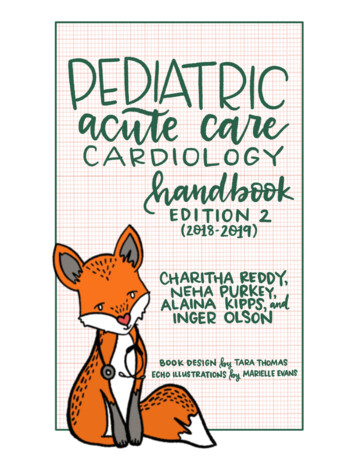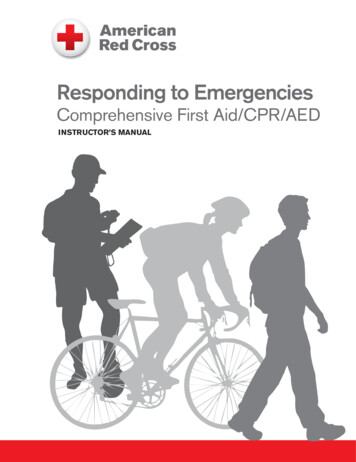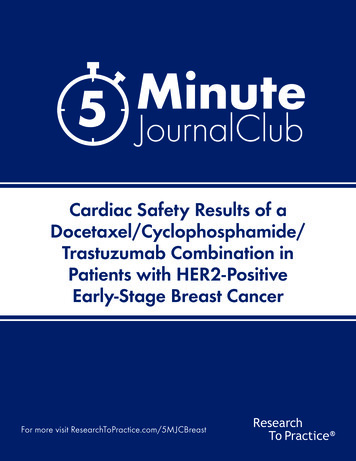
Transcription
Cardiac Safety Results of aDocetaxel/Cyclophosphamide/Trastuzumab Combination inPatients with HER2-PositiveEarly-Stage Breast CancerFor more visit ResearchToPractice.com/5MJCBreast
CME INFORMATIONOVERVIEW OF ACTIVITYThe annual San Antonio Breast Cancer Symposium (SABCS) is unmatched in its significance with regard to the advancement of breastcancer treatment. It is targeted by many members of the clinical research community as the optimal forum in which to unveil new clinicaldata. This creates an environment each year where published results from a plethora of ongoing clinical trials lead to the emergenceof many new therapeutic agents and changes in the indications for existing treatments across all breast cancer subtypes. In order tooffer optimal patient care — including the option of clinical trial participation — the practicing medical oncologist must be well informedof the rapidly evolving data sets in breast cancer. To bridge the gap between research and patient care, this CME activity will deliver aserial review of the most important emerging data sets from the latest SABCS meeting, including expert perspectives on how these newevidence-based concepts can be applied to routine clinical care. This activity will assist medical oncologists and other cancer clinicians inthe formulation of optimal clinical management strategies for breast cancer.LEARNING OBJECTIVE Identify the cardiac safety of the combined regimen of docetaxel, cyclophosphamide and trastuzumab when administered in theadjuvant setting to patients with HER2-positive early-stage breast cancer.ACCREDITATION STATEMENTResearch To Practice is accredited by the Accreditation Council for Continuing Medical Education to provide continuing medical educationfor physicians.CREDIT DESIGNATION STATEMENTResearch To Practice designates this educational activity for a maximum of 0.25 AMA PRA Category 1 Credits . Physicians should onlyclaim credit commensurate with the extent of their participation in the activity.HOW TO USE THIS CME ACTIVITYThis CME activity contains slides and edited commentary. To receive credit, the participant should review the slide presentation, read thecommentary and complete the Educational Assessment and Credit Form located at CME.ResearchToPractice.com.CONTENT VALIDATION AND DISCLOSURESResearch To Practice (RTP) is committed to providing its participants with high-quality, unbiased and state-of-the-art education. Weassess potential conflicts of interest with faculty, planners and managers of CME activities. Real or apparent conflicts of interest areidentified and resolved through a conflict of interest resolution process. In addition, all activity content is reviewed by both a member ofthe RTP scientific staff and an external, independent physician reviewer for fair balance, scientific objectivity of studies referenced andpatient care recommendations.FACULTY — The following faculty (and their spouses/partners)reported real or apparent conflicts of interest, which have beenresolved through a conflict of interest resolution process:RESEARCH TO PRACTICE STAFF AND EXTERNAL REVIEWERS— The scientific staff and reviewers for Research To Practice haveno real or apparent conflicts of interest to disclose.Mark D Pegram, MDFull Professor of MedicineDirector for the Translational Research ProgramBraman Family Breast Cancer Research InstituteUM Sylvester Comprehensive Cancer CenterMiami, FloridaThis educational activity contains discussion of publishedand/or investigational uses of agents that are not indicated bythe Food and Drug Administration. Research To Practice doesnot recommend the use of any agent outside of the labeledindications. Please refer to the official prescribing informationfor each product for discussion of approved indications,contraindications and warnings. The opinions expressed are thoseof the presenters and are not to be construed as those of thepublisher or grantors.Advisory Committee: Amgen Inc, Genentech BioOncology,Genomic Health Inc, GlaxoSmithKline, Sanofi-Aventis; ConsultingAgreements: Genentech BioOncology, GlaxoSmithKline,Sanofi-Aventis; Data Safety and Monitoring Board: Wyeth;Paid Research: Sanofi-Aventis; Speakers Bureau: GenentechBioOncology, Genomic Health Inc, GlaxoSmithKline, SanofiAventis.EDITOR — Neil Love: Dr Love is president and CEO of ResearchTo Practice, which receives funds in the form of educationalgrants to develop CME activities from the following commercialinterests: Abraxis BioScience, Amgen Inc, AstraZenecaPharmaceuticals LP, Bayer Pharmaceuticals Corporation/OnyxPharmaceuticals Inc, Biogen Idec, Boehringer IngelheimPharmaceuticals Inc, Bristol-Myers Squibb Company, CelgeneCorporation, Centocor Ortho Biotech Services LLC, Cephalon Inc,Eisai Inc, EMD Serono Inc, Genentech BioOncology, GenomicHealth Inc, Genzyme Corporation, GlaxoSmithKline, ImCloneSystems Incorporated, Lilly USA LLC, Millennium PharmaceuticalsInc, Monogram BioSciences Inc, Novartis PharmaceuticalsCorporation, OSI Oncology, Roche Laboratories Inc, SanofiAventis and Spectrum Pharmaceuticals Inc.This program is supported by educational grants fromAstraZeneca Pharmaceuticals LP, Bayer PharmaceuticalsCorporation/Onyx Pharmaceuticals Inc, Genentech BioOncology,Genomic Health Inc and GlaxoSmithKline.Last review date: February 2010Expiration date: February 2011
IN THIS ISSUE: Trastuzumab/lapatinib demonstrates survival advantage in metastaticHER2-positive breast cancer Adjuvant therapy in patients with small node-negative, HER2-positive tumors Trastuzumab/TC as adjuvant therapyShortly before the recent Pro Bowl in Miami, our CME group hosted a marquee eventof our own about ten minutes from the stadium as nine breast cancer “all stars” cametogether in our sound studio for a daylong think tank audio recording. It’s not surprisingthat my mental highlight film from the meeting includes many innovative ideas andpoignant comments by the soft-spoken and super-smart Harvard maven, Dr Paul Goss.In a follow-up audio interview with Paul, he thoughtfully discussed several patientsfrom his practice. The case that stood out for me was a 38-year-old woman who camefor a second opinion after having received several different chemo/anti-HER2 regimensfor metastatic disease. This patient’s original primary tumor was ER-positive, HER2positive, but on recurrence a vertebral biopsy revealed HER2-positive, ER-negativedisease, and she had not received endocrine therapy since the disease recurred.According to Paul, at this point the woman was sick and tired of being sick and tired ofchemo, which in part prompted his highly interesting and somewhat unusual treatmentrecommendation of the combination of letrozole, trastuzumab and lapatinib, aninnovative biologic triplet that makes a lot more sense since Kim Blackwell’s stunningSan Antonio presentation profiled in our slide set, which compared lapatinib totrastuzumab/lapatinib in patients with heavily pretreated metastatic disease. Herpresentation was an update of the data that were just published in the Journal ofClinical Oncology.Listening to Paul’s case, I was particularly interested in his explanation for usingendocrine therapy in spite of a recent ER-negative biopsy, which was based on hisconcern about the possibility of sampling error particularly because the tissue biopsiedwas bone, which he feels is ripe for inaccuracies. An equally important factor in hisrecommendation is the relative lack of toxicity with hormone therapy and the recentdata supporting the addition of anti-HER2 therapy to up-front endocrine treatment ofmetastatic disease. Paul and others believe that anti-HER2 treatment may potentiate
endocrine therapy by a variety of mechanisms including interference with ligandindependent ER activation.In terms of the HER2 part of this interesting triplet, Paul, like most San Antonioattendees, was very impressed with the trastuzumab/lapatinib data set — one of thevery few recent trials to demonstrate a survival benefit in metastatic disease in spiteof a built-in crossover design. Dr Goss believes part of the explanation for this findingis that these patients had received so many prior therapies that post-trial interventionhad less impact. Another important principle borne out by this study is the potentialbenefit of continuing trastuzumab beyond disease progression, which was previouslysupported by the German trial of trastuzumab/capecitabine in patients with diseaseprogression on trastuzumab with other chemo agents. During the think tank, thefaculty commented on the sea change in approach to patients with metastaticHER2-positive disease that resulted from this study and the trastuzumab/lapatinib trialin which continuous anti-HER2 therapy has quickly become routine clinical practice.Although many viewed the recent Pro Bowl as a sham in which the participantsseemingly could have cared less about the outcome, I smile inwardly reflecting ona pretty amazing day with Paul and our other “All Pro” investigators. The intriguingclinical and laboratory science discussed that “Super” day suggests that the biology ofthis disease is finally coming together in a way that maybe will soon have a meaningfulimpact on patient care.Next up on 5-Minute Journal Club: San Antonio excitement on bone-targeted therapy.Neil Love, MDResearch To PracticeMiami, FloridaResearch To Practice is accredited by the Accreditation Council for Continuing Medical Education toprovide continuing medical education for physicians.Research To Practice designates each of the four educational activities, comprised of a slide setand accompanying commentary, for a maximum of 0.25 AMA PRA Category 1 CreditsTM. Physiciansshould only claim credit commensurate with the extent of their participation in the activity.Research To PracticeOne Biscayne Tower2 South Biscayne Boulevard, Suite 3600Miami, FL 33131This email was sent to you by Dr Neil Love and Research To Practice. To unsubscribe to futureemail requests and announcements, click here. To update your information on our currentdistribution lists, click here.
Cardiac Safety Results of a Docetaxel/Cyclophosphamide/Trastuzumab Combination in Patients with HER2-PositiveEarly-Stage Breast CancerPresentation discussed in this issueJones SE et al. Cardiac safety results of a Phase II trial of adjuvant docetaxel,cyclophosphamide plus trastuzumab in Her2 early stage breast cancerpatients. San Antonio Breast Cancer Symposium 2009;Abstract 5082.Slides from a presentation at SABCS 2009 and transcribed commentsfrom a recent interview with Mark D Pegram, MD (12/23/09)For more visit ResearchToPractice.com/5MJCBreast
For more visit ResearchToPractice.com/5MJCBreast
For more visit ResearchToPractice.com/5MJCBreast
For more visit ResearchToPractice.com/5MJCBreast
For more visit ResearchToPractice.com/5MJCBreast
DR PEGRAM: The docetaxel/cyclophosphamide combination is a very reasonablebackbone on which to add trastuzumab. We had previously published data showingthat cyclophosphamide was synergistic with trastuzumab, much the same as platinumsalts are synergistic with trastuzumab in preclinical models. The scientific rationalehere is sound.Moreover, in the Phase III BCIRG 007 trial, when we evaluated docetaxel/trastuzumabwith or without carboplatin, there was actually no statistically significant differencebetween the two arms. This suggests that carboplatin may not be the home runwe had hoped it would be, and it opens the door for other agents to be studied.Cyclophosphamide is a reasonable candidate.These data are based on 260 patients with HER2-positive breast cancer who havebeen followed for one year on this adjuvant study of trastuzumab combined withdocetaxel/cyclophosphamide (Her TC). The median age was 55 years old.In this trial, 27 patients, or 10.3 percent, discontinued treatment due to adverseevents. Cyclophosphamide is extremely well tolerated. I can’t imagine that it wouldbe any less tolerable than carboplatin, though I don’t know that it is better tolerated.Carboplatin may cause more peripheral neuropathy, which is a consideration forpatients with preexisting conditions such as diabetes, and it has a greater effect onthe platelet count.I’ve used this Her TC regimen and I like it. I’ve even had the occasion to use it offstudy, and I believe it’s reasonable to move it forward. Based on our experiencewith TCH, these data are about what I would expect. In the BCIRG 006 trial, it wasexceedingly rare to withdraw a patient from TCH as a consequence of LVEF declines.Patients who received ACTH, however, had statistically significant drops in EF.In terms of cardiac events, this Her TC combination looks fairly comparable to theclassic docetaxel/carboplatin/trastuzumab (TCH) regimen used in the BCIRG 006 trial.In this trial, 16 patients, or 6.1 percent, had declines of LVEF to 50 percent or lessduring treatment, and there were no cases of clinical congestive heart failure. In theBCIRG 006 trial, which randomly assigned over 1,000 patients to TCH, the incidence ofclinical congestive heart failure was approximately 0.4 percent, so very close to zero.We have a lot of data on the TC regimen in non-HER2-positive disease, showing thatit’s superior to AC, so why not use it as a base for treating HER2-positive disease? Ibelieve that makes perfect sense. My personal philosophy is that in the grand schemeof things, I believe history will record that which chemotherapy backbone we use withHER2-targeted therapy is irrelevant. The important consideration is the integration ofthe HER2-targeted agent, and there are any number of combinations that I would becomfortable with, including Her TC.For more visit ResearchToPractice.com/5MJCBreast
Dr Pegram is Full Professor of Medicine and Director for the Translational ResearchProgram at the Braman Family Breast Cancer Research Institute at UM SylvesterComprehensive Cancer Center in Miami, Florida.For more visit ResearchToPractice.com/5MJCBreast
Trastuzumab/TC as adjuvant therapy Shortly before the recent Pro Bowl in Miami, our CME group hosted a marquee event of our own about ten minutes from the stadium as nine breast cancer "all stars" came together in our sound studio for a daylong think tank audio recording. It's not surprising
